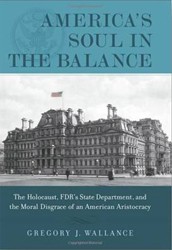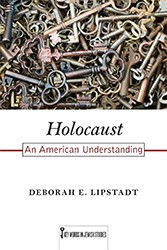Robert Jan van Pelt, professor of architecture at University of Waterloo in Canada, is one of the foremost authorities on Auschwitz. His history of Auschwitz, co-written with Deborah Dwork, remains essential reading on the notorious death camp. He has appeared on PBS to give a detailed account of the ways in which the Auschwitz gas chamber was designed to murder Jews — exposing the murderous intent of the Nazi bureaucrats who designed them. Given his expertise, it is not surprising that van Pelt was called on to refute the claims of Holocaust deniers — David Irving, Fred A. Leuchter, and others — who continue to deny the existence of gas chambers in extermination camps. The Case for Auschwitz recounts the evidence and process of the trial.
In discordance with historical evidence, Irving and other deniers argue that the Nazis did not have a systematic program to exterminate the Jews, but rather that the Jews who died succumbed to the ordinary violence of war. Irving justified his assertion by referencing Leuchter and his pseudoscientific report, which contended that there were no homicidal gas chambers in Auschwitz. These issues reemerged and were recorded at the libel trial Irving brought before the British High Court in January of 2000. Irving sued American historian Deborah Lipstadt who, in her book Denying the Holocaust: The Growing Assault on Truth and Memory, had labeled Irving as a Holocaust denier who had falsified many legitimate documents. The court ruled in favor of Lipstadt, dealing a crushing blow to Holocaust deniers.
For his testimony, van Pelt prepared and defended a 700-page report that addressed the core issue of the proceedings: historical evidence that proved the existence of the gas chambers at Auschwitz. In writing The Case for Auschwitz, van Pelt states that “it was my task … to help the defense … convince the judge that no serious historian who had considered the evidence would have serious cause to doubt that there were gas chambers at Auschwitz.”
The bulk of The Case for Auschwitz presents the evidence van Pelt submitted to the court.
Although at times potentially difficult for the lay reader, this book is worth reading for its explanation of how and why Auschwitz became central in the Irving-Lipstadt trial, as well as why the gas chambers have become so important for Holocaust denial. It is a significant contribution to the Holocaust canon.
Related Content:





